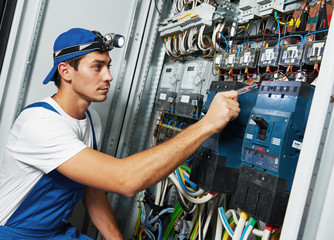Among the various jobs available in the construction industry, an electrician may find work in homes, factories, and marine areas. There are several requirements for becoming an electrician, including an apprenticeship, certification, and specialties.

Typical electrician duties include installing and maintaining electrical power systems. Electrical is responsible for electrical wiring in residential homes, factories, and marine areas. They use various tools to test voltage and resistance. They also perform repairs and maintenance. Some specialize in low-voltage systems. They also work with security systems and internet systems.
These professionals install, maintain, and upgrade electrical infrastructure. Some specialize in the installation of automated systems. They also inspect and repair components of automation systems. They also maintain equipment used on roadways and highways. These professionals install, maintain, and repair telecommunications lines. They also work at heights. Their job can be dangerous because of the risk of electrocution. They also need to follow safety regulations. They also need to be knowledgeable about the National Electrical Code.
Electricians install and repair electrical systems in factories and industrial buildings. They may also provide professional advice to customers. Some electricians specialize in residential electrical work, installing and maintaining lighting systems, switches, receptacles and other fixtures. They may also work in commercial settings, such as offices and stores. They may work in close conjunction with alarm system technicians and elevator installers.
Electricians must be trained in safe working practices. They also must follow safety guidelines and maintain a license. Some electricians also take on managerial responsibilities. They can develop training programs, oversee work teams and conduct employee evaluations. Electrical wiring technicians must plan installations from blueprints and prepare job estimates and reports. They must also prepare load surveys to ensure that electrical components will work in the building. Depending on the size of the project, they may also need to coordinate with other construction professionals.
Licensed electricians can choose from a variety of specialty areas. Whether you want to specialize in installing fire alarm systems or wind turbines, there is a niche for you. These specialty areas offer higher pay and increased job satisfaction. Installing solar panels continues to increase in popularity. Many electricians specialize in this area. They install photovoltaic systems and often travel to different locations. They also maintain these systems.
Commercial electricians install and repair power systems and electronic systems. They also install, repair and maintain office air conditioning systems. They also install and repair security systems. They work in larger businesses, as well as smaller ones. High-voltage lineman work on high-tension voltage lines. They also inspect electrical motors and ensure they are working properly. They may also be called to install alarm systems or other electrical equipment.
Obtaining an apprenticeship is the best way to get started in the electrical industry. An apprenticeship is a training program in which you learn the trade while earning a wage. Unions and private companies offer apprenticeships. An apprenticeship combines classroom instruction, on-the-job training, and hands-on work. It takes several years to complete an apprenticeship program, and you can earn while you learn. Some apprentices are eligible to earn college credit for their apprenticeship experience.
To become an electrician, you will need a high school diploma or a GED. You will also need at least basic math and science knowledge. You may also have to complete an aptitude test. The first step to an apprenticeship is finding a company in your area participating in the program. You can find these companies through local unions or career centers.
Certification as an electrician reduces the time required to complete an apprenticeship. Whether you’re looking to start your career in the electrical industry or simply want to earn more money, becoming an electrician can be an easy choice. Electricians install, maintain, and troubleshoot electrical power systems and control systems. They also work on residential and commercial buildings.
Typically, an electrician will start his career as an apprentice. This means that he’ll work under the supervision of a master electrician. He’ll earn wages while he’s working, and his salary will gradually increase as his skills increase. An electrician can also opt to become self-employed and work the hours he desires. Typically, an electrician’s job will include installing electrical power systems and maintaining the communication and control systems. He’ll also repair air conditioning units, security systems, and other household appliances. He’ll also be responsible for testing equipment.
